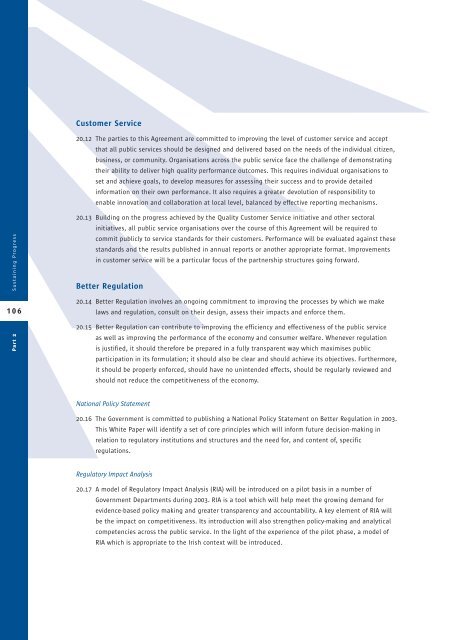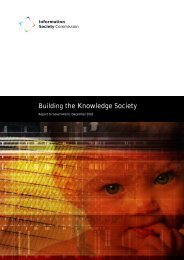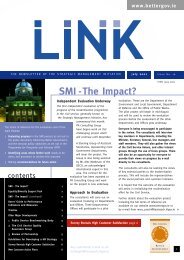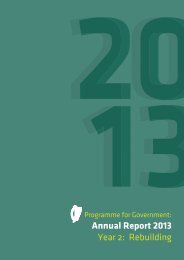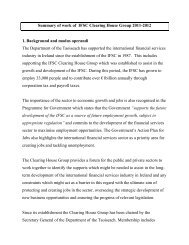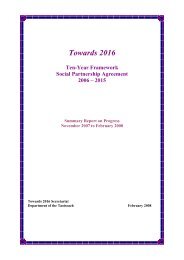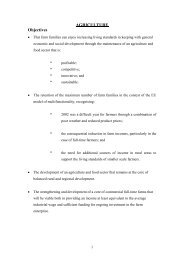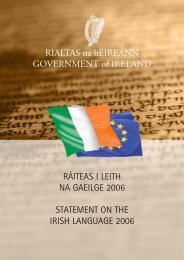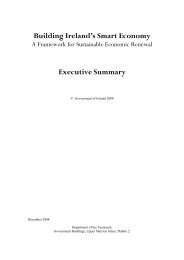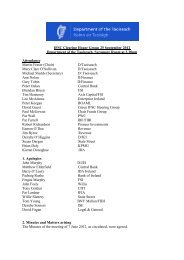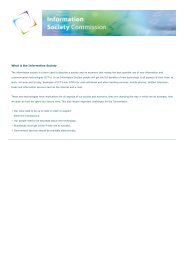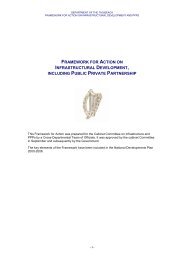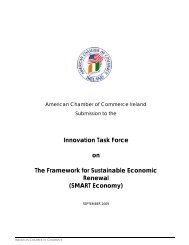Sustaining Progress - Department of Taoiseach
Sustaining Progress - Department of Taoiseach
Sustaining Progress - Department of Taoiseach
You also want an ePaper? Increase the reach of your titles
YUMPU automatically turns print PDFs into web optimized ePapers that Google loves.
Part 2 <strong>Sustaining</strong> <strong>Progress</strong><br />
106<br />
Customer Service<br />
20.12 The parties to this Agreement are committed to improving the level <strong>of</strong> customer service and accept<br />
that all public services should be designed and delivered based on the needs <strong>of</strong> the individual citizen,<br />
business, or community. Organisations across the public service face the challenge <strong>of</strong> demonstrating<br />
their ability to deliver high quality performance outcomes. This requires individual organisations to<br />
set and achieve goals, to develop measures for assessing their success and to provide detailed<br />
information on their own performance. It also requires a greater devolution <strong>of</strong> responsibility to<br />
enable innovation and collaboration at local level, balanced by effective reporting mechanisms.<br />
20.13 Building on the progress achieved by the Quality Customer Service initiative and other sectoral<br />
initiatives, all public service organisations over the course <strong>of</strong> this Agreement will be required to<br />
commit publicly to service standards for their customers. Performance will be evaluated against these<br />
standards and the results published in annual reports or another appropriate format. Improvements<br />
in customer service will be a particular focus <strong>of</strong> the partnership structures going forward.<br />
Better Regulation<br />
20.14 Better Regulation involves an ongoing commitment to improving the processes by which we make<br />
laws and regulation, consult on their design, assess their impacts and enforce them.<br />
20.15 Better Regulation can contribute to improving the efficiency and effectiveness <strong>of</strong> the public service<br />
as well as improving the performance <strong>of</strong> the economy and consumer welfare. Whenever regulation<br />
is justified, it should therefore be prepared in a fully transparent way which maximises public<br />
participation in its formulation; it should also be clear and should achieve its objectives. Furthermore,<br />
it should be properly enforced, should have no unintended effects, should be regularly reviewed and<br />
should not reduce the competitiveness <strong>of</strong> the economy.<br />
National Policy Statement<br />
20.16 The Government is committed to publishing a National Policy Statement on Better Regulation in 2003.<br />
This White Paper will identify a set <strong>of</strong> core principles which will inform future decision-making in<br />
relation to regulatory institutions and structures and the need for, and content <strong>of</strong>, specific<br />
regulations.<br />
Regulatory Impact Analysis<br />
20.17 A model <strong>of</strong> Regulatory Impact Analysis (RIA) will be introduced on a pilot basis in a number <strong>of</strong><br />
Government <strong>Department</strong>s during 2003. RIA is a tool which will help meet the growing demand for<br />
evidence-based policy making and greater transparency and accountability. A key element <strong>of</strong> RIA will<br />
be the impact on competitiveness. Its introduction will also strengthen policy-making and analytical<br />
competencies across the public service. In the light <strong>of</strong> the experience <strong>of</strong> the pilot phase, a model <strong>of</strong><br />
RIA which is appropriate to the Irish context will be introduced.


